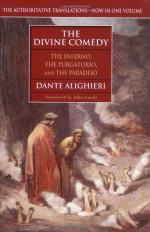|
This section contains 4,890 words (approx. 17 pages at 300 words per page) |

|
SOURCE: “The Last Wound: Purgatorio, XXVI,” Italian Quarterly, Vol. 12, No. 45, Summer, 1968, pp. 27-43.
In the following essay, Koffler contends that critics who decry a lack of drama in the Purgatorio are mistaken. Koffler states that the action is simply of a different type than that found in the Inferno, and that Dante thereby demonstrates in his own poem the art of renunciation.
Dante's last meeting with fellow poets in the twenty-sixth canto of the Purgatorio—that canticle which seems almost to suggest, at times, that poets belong in Purgatory as sinners belong in Hell and saints in Heaven—has long struck critics as a drama manqué. There is something anticlimactic about the very narrative structure of this canto, something which (to quote one such critic, Irma Brandeis) “shift[s] the narrative stress away from its emotional centre, and thus from its small dramatic potentiality.”1 I want first of...
|
This section contains 4,890 words (approx. 17 pages at 300 words per page) |

|


